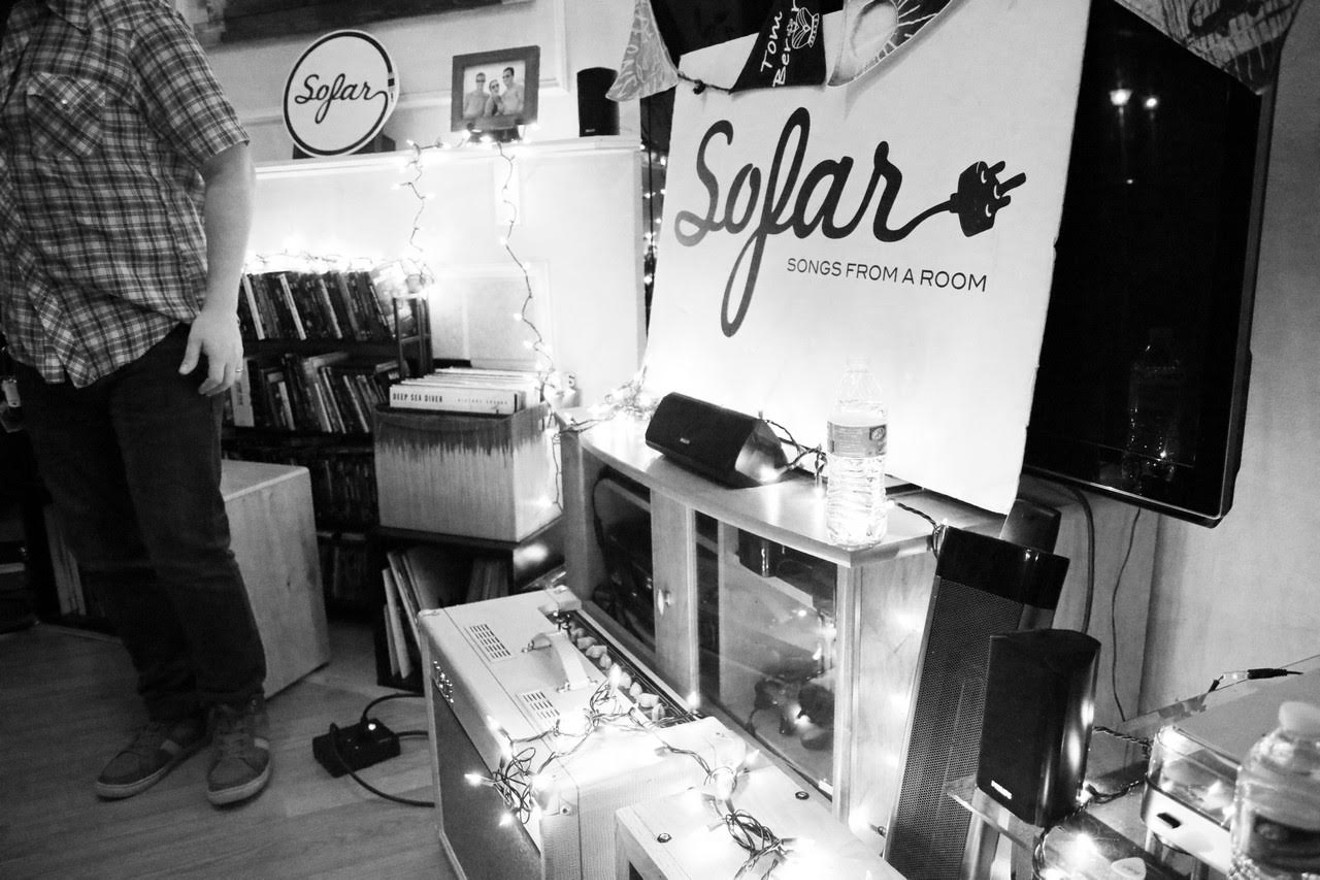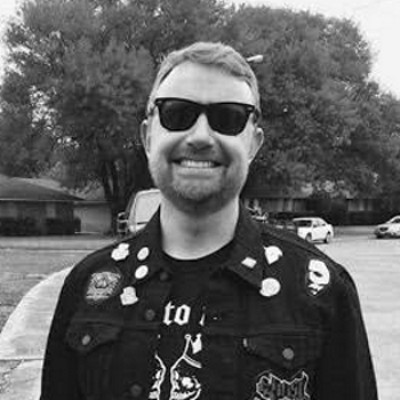SoFar shows are more showcase previews than what you'd see at a club. The lineup is not advertised ahead of time. On the SoFar website, users can view upcoming shows in their cities. Only the neighborhood and the time of the show is listed.
At that point, you can "apply" for tickets, which are $13 to $15. If you are accepted, you will be sent the show details the day before the event. Once you get there, each artist will play for 20 minutes while you and a couple dozen other attendees sit on the ground, watching.
The shows are heavily branded, and attendees are encouraged to take pictures and videos on their phones during performances and post them to Facebook and Instagram. There are short breaks, but you are discouraged from leaving until all of the performances have finished.
If you're a musician, this setup is theoretically a good way to get your name out to an audience that's actually paying attention and listening. But after a story by an NPR affiliate in San Francisco was passed around Facebook, locals began asking where the proceeds from ticket sales were going and whether an invitation to play one of the shows is really the great opportunity it's made out to be.
Sean Kirkpatrick of Nervous Curtains says his band was asked to play one of the company's shows in Denton. SoFar says it's not trying to compete with other locals putting on house shows, but to Kirkpatrick, it seemed liked it was trying to capitalize on that trend.
“It's not my place to tell them they shouldn't interfere with the house-show world,” he says. “They have apparently tapped into a clientele that isn't otherwise tuned into local DIY events in their community.”
SoFar typically doesn't pay the musicians who perform. Instead, it offers them exposure and professionally shot and edited videos of their performances."I have been handed far less than $50 for a one-hour set in a 'legit club,'" drummer Jeff Gretz says.
tweet this
Nervous Curtains has toured throughout the country and has a solid fan base, so it wasn't worth it for the group.
“For a band that has been around as long as we have and have made multiple music videos, that has no value to us,” Kirkpatrick says. “Plus, we did Violitionist Sessions [a Denton project to interview and record local bands] twice without having to feel that someone else was profiting off our art.”
Kirkpatrick says he was told that if Nervous Curtains played a second show with SoFar, it would receive a $50 guarantee.
“That's roughly 3 percent of the draw they're claiming to make off ticket sales. It's absurd. Plus, they [were] asking us to work up a whole special set for this show.”
SoFar started in 2009 in London, but it wasn't a business at first. Rafe Offer, who is from Chicago but had moved to London for work, co-founded SoFar with two partners, Dave Alexander and Rocky Start. They came up with the concept after a not-so-positive experience at a Friendly Fires show, where the music was drowned out by chatter and clinking glasses.
“What we came up with was not a new idea,” Offer says. “People have been having house concerts since Mozart’s time. It was just new at that moment to us because we were so fed up. So we just tried it in Dave’s house and that was the first one.”
Their first show was a success; it was so still in the room that attendees could hear the clocks ticking. They continued to throw shows, run by volunteers who would also take donations for the artists, but for the first five years it was just a hobby.
At that point, SoFar began expanding beyond London into other major cities, and it reached Dallas in 2012. Joanna Jurgens, a woman who had experience booking shows, stepped in to helm the DFW branch, which she continues to do.
Because the pay-what-you-want system wasn't yielding much profit for the company or the artists, SoFar Sounds sold the bands on the exposure they'd get from playing. The arrangement was particularly attractive to unknown visiting artists, who were guaranteed audiences with support from well-known locals.
SoFar's model worked well enough to get into 60 countries. Richard Branson’s Virgin empire is now a financial partner, and the company collaborated with Airbnb in March.
As SoFar Sounds' growth continued, it became necessary to clarify whether it was a nonprofit or a for-profit business. Offer says they went with the latter to cover the cost their website and insurance, and they switched from the donation model to charging for tickets.
Offer says most artists who have played the shows have been less interested in payment than the videos they'll receive, which are paid for through ticket sales. He adds that he'd like to pass cash from ticket sales on to the artists, but right now, SoFar is a startup going through startup growing pains.
“We made a mistake, to be perfectly honest,” Offer says. “We didn’t inform everyone we were growing so quickly, like a lot of startups do. We didn’t inform everyone about the test. Meanwhile, the test recently started to work, meaning people were actually paying $15 in advance. Keep in mind, we passed a hat for all those years; we didn’t think anyone would pay after that, but they did and they liked it.”
Jurgens says the DFW branch of SoFar played a role in growing the careers of Leon Bridges and Luke Wade.
“Our goal is encourage people to go and pay [for] tickets and support these artists after they see them at our shows," she says.
Katelyn Reeves says it didn't work out like that for a band she manages, Siberian Traps. The group played its only SoFar show last summer.
“The show itself was fine,” Reeves says. “We still haven't received the video, though.”
She's not convinced it did much for the band in the way of exposure, either. “It's almost like it didn't even happen,” she says. “I'm not sure that they gained any new fans through the experience.”
Cal Quinn has hosted shows and run sound and audio production for SoFar. He wants better pay for the artists, audio engineers and videographers.
“As of now, the videos artists walk away with are hit-or-miss in quality. [If the pay was better,] videos and audio could be of consistent high quality and be considered viable as part of the compensation,” he says. “Let's not forget that those behind the scenes are artists in their own right and deserve fair compensation.”
Offer seems aware that the system is not flawless. “With Dallas artists, I’m sure not every story is a great one,” he says. “We’re not perfect, but there have been some good things to talk about.”
However, many people said they were satisfied with the experience and would do it again.
“We actually had a great time, and the hosts and organizers were super accommodating,” says Bill Spellman, whose band the Blurries has played a SoFar show.
Andrew Brown Weir remembers playing two SoFar shows with his old band, Soviet — one in a Lakewood home and another in a home close to White Rock Lake.
Like all SoFar artists, Soviet stripped its sound down to an acoustic performance, and he says it played to a good-sized crowd.
“We networked with some people that were guests at the show that ended up helping us record and release some tracks,” Weir says. “It was fun and mutually beneficial from what I recall.”
Singer-songwriter Summer Dean has played her mix of country and folk at three SoFar shows.
“For the most part, I enjoy playing SoFar because [of] the listeners," she says. "A quiet room full of attentive listeners can be a nice break from the big sounds of the bars and honky-tonks. Converting those listeners into fans that download music and come to shows is yet to be determined. The staff with SoFar has always been professional, appreciative and attentive in every experience I've had.”
Musicians in other cities have had similar experiences. Jeff Gretz, drummer of Emanuel and the Fear, has played multiple SoFar shows in New York basements and apartments. His band has varied its lineup from a duo to a six-piece for each show and seen a positive response.
“We like the SoFar shows because nobody knows who is playing until they get there. It's literally a captive, hungry audience. We have heard complaints about the pay system they have, but at the same time, you are playing four songs tops. We always do it acoustically with minimal gear, and we have sold far more records and CDs at these shows than we do [at] our own publicized club shows," he says. “I have been handed far less than $50 for a one-hour set in a ‘legit club’ as a result of various shady promoter practices."













